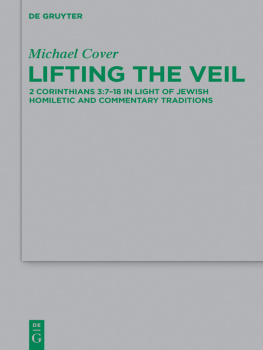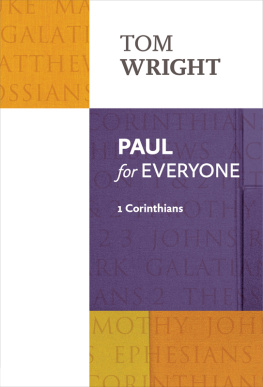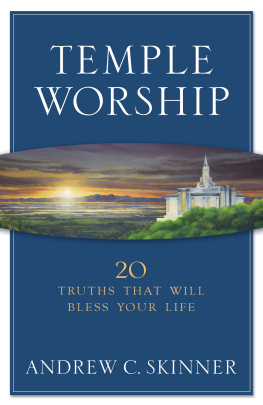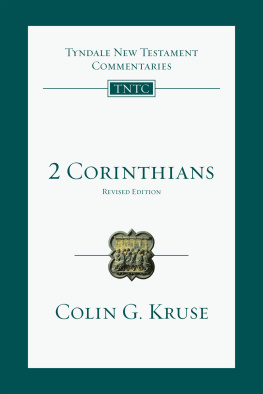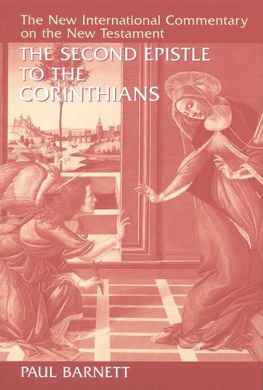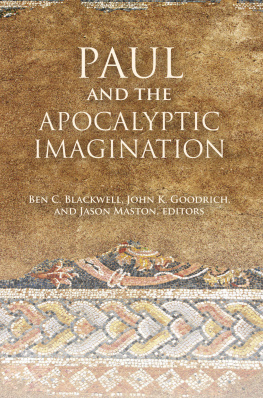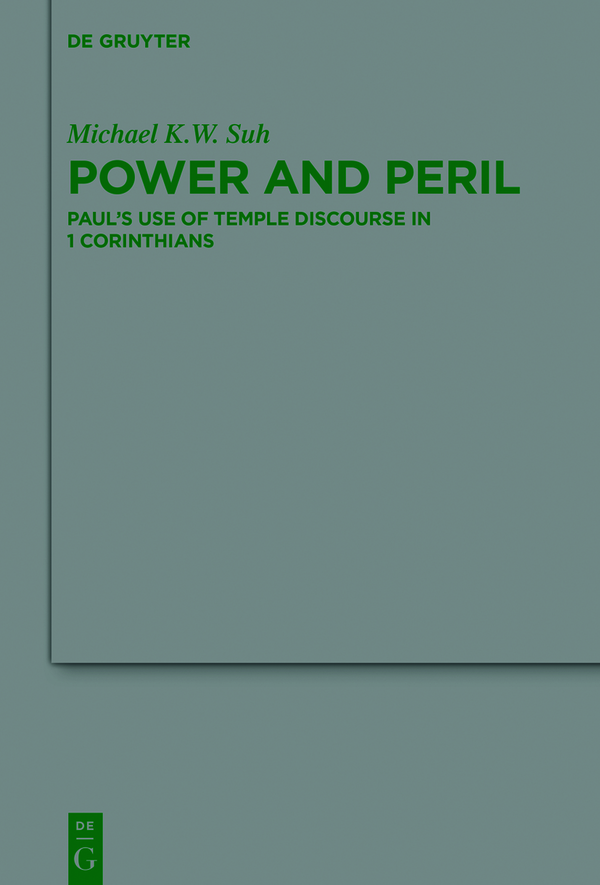Beihefte zur Zeitschrift fr die neutestamentliche Wissenschaft
Edited by
Matthias Konradt
Erich Grer
Richard B. Hays
Judith Lieu
Laura Nasrallah
Jens Schrter
Gregory Sterling
Carl Holladay
Hermann Lichtenberger
James D. G. Dunn
Michael Wolter
Volume
ISBN 9783110678840
e-ISBN (PDF) 9783110678949
e-ISBN (EPUB) 9783110678970
Bibliographic information published by the Deutsche Nationalbibliothek
The Deutsche Nationalbibliothek lists this publication in the Deutsche Nationalbibliografie; detailed bibliographic data are available on the Internet at http://dnb.dnb.de.
2020 Walter de Gruyter GmbH, Berlin/Boston
Preface
This book is a revised version of the doctoral dissertation written at Emory University, and so my committee deserves many thanks. Professor Carl Holladay has instilled in me a deep appreciation of the Jewish milieu of the New Testament. His words of encouragement and tales of his travels around the world (always with tantalizing details that make for such great stories!) have provided me with much needed laughter and energy during the completion of this project. His embodiment of the consummate professional and scholar will always remain a model. Professor Walter Wilsons incisive questions have driven me to be clear and efficient in my argumentation, and this project stands better because of his critical eye. Professor Cynthia Patterson, from the Department of History, has graciously welcomed into her office a dilettante in the world of Greek historiography. Her enthusiasm concerning all my sophomoric questions have opened up an avenue of historical inquiry of which I have only begun to scratch the surface in this project. Finally, the biggest thanks are due to Professor Luke Timothy Johnson. When I think of Luke, an old Korean idiom comes to mind, one that can roughly be translated: Leader, teacher, and parent are one. Luke truly embodies this idiom, and without his support and guidance as a leader, teacher, and Doktorvater, this project would never have seen the light of day, still less come to its eventual completion. His excitement concerning this project since the beginning to its end is a testimony to his unwavering commitment to see his students succeed from day one. If I can replicate even a tenth of his energy as a scholar and teacher, I will consider my academic career to have been a success.
Earlier portions of chapter 2 first appeared in Vigiliae Christianae as in 1 Corinthians 5:5: A Reconsideration of Patristic Exegesis, VC 72 (2018): 121141. I am grateful to Brill and the editors of VC for providing permission to republish this work. Many thanks to Albrecht Dhnert, Alice Meroz, Jana Fritsche, and Florian Ruppenstein of De Gruyter for accepting this work and for their guidance through the editorial process. I am also honored that the editors of BZNW have accepted this work for their prestigious series.
There are also many friends and family who have watched the progress of this project from both near and far. My wonderful colleagues at Emory University deserve many thanks: Tony Alonso, David Carr, Collin Cornell, Chris Holmes, Eric Moore, Jenny Pietz, Devin White, and Jennifer Wyant. Above all, Jonathan Potter has been a great friend and valuable conversation partner. Special thanks are also due to my colleague and friend, Johann Choi, and his wife, Jina Choi, for sharing their life together with my family and me.
I would also like to thank the Undergraduate Research Programs at Emory University for providing the final year of funding and support. Our directors, Folashade Alao, Rachel Diamond, and Pat Marsteller, provided sage guidance to our cohort of graduate fellows (Michael Thees, Aime Vester, Signe White, and Julian Whitney) as we met weekly to discuss classroom strategies, research translation, and professional development. I will always be grateful for the opportunity I had to learn from such a talented and diverse group of scholars. Thanks are also due to Dean Lisa Tedesco, Associate Dean Rosemary Hynes, and Professor Walter Melion (Art History) of Emorys Laney Graduate School, whom I have had the pleasure of working with through the Andrew W. Mellon Humanities Ph.D. Interventions Project. They have been immensely supportive of my own research and writing even as they have taught me the value of interdisciplinary dialogue and the difficult but rewarding work of advancing graduate education in the 21st century.
Also, much thanks are due to my mother, In-Young Suh and my sister, Mina Suh. My father, Yoon-Suk Suh, passed away many years before I had even begun this chapter of my life, but I hope that he would have been proud of this accomplishment. Special thanks also to my other parents (in-law), David Kang and Jean Kang, who have been one of my biggest supporters from afar.
Last, but certainly not least, my deepest gratitude is due to my wife, Janice Kang. She has watched me pursue this passion from the earliest days prior to our marriage, to the eventual completion of this project many years later. She is truly my better-half and I am undoubtedly a better thinker, writer, and most importantly, a better person because of her. Thank you.
Abbreviations
Agora XVI
Woodhead, A.G. The Athenian Agora XVI. Inscriptions: The Decrees. Princeton: American School of Classical Studies at Athens, 1997.
BGU
Aegyptische Urkunden aus den Museen zu Berlin: Griechische Urkunden IVIII, 18951933.
BIWK
Petzl, Georg. Die Beichtinschriften Westkleinasiens (special issue, EpAnat 22). Bonn: 1994.
CID
Corpus des inscriptions de Delphes. 4 vols. Paris: de Boccard, 19772002.
I: G. Rougemont, ed (1977). Lois sacres et rglements religieux.
II: J. Bousquet, ed (1989). Les comptes du quatrime et du troisime sicles.
III: A. Blis, ed. (1992). Les hymnes Apollon.
IV: D. Lefvre, D. Laroche, and O. Masson, ed. (2002). Documents Amphictioniques.
CIL
Mommsen, Theodore et al. Corpus Inscriptionum Latinarum. 17 vols. in 78. Berglin: 1863.
CMRDM
Lane, Eugene N. Corpus monumentorum religionis dei Menis. 4 vols. Leiden: Brill, 19711978.
CPJ
Tcherikover, Victor A., Alexander Fuks, and Menahem Stern, ed. Corpus Papyrorum Judaicarum. 3 vols. Cambridge: Harvard University Press, 19571964.
Edelstein
Edelstein, Emma J. and Ludwig Edelstein. Asclepius: Collection and Interpretation of the Testimonies. 2 vols. Baltimore: The Johns Hopkins Press, 1975 [1945].
F. Delphes III,3
Fouilles de Delphes III. 2 vols. Paris: de Boccard, 19321943.
1: G. Daux, ed. (1932). Du trsor des Athniens jusquaux bases de Glon.
2: G. Daux, ed. (1943). Du trsor des Athniens jusquaux bases de Glon.
Halikarnassos
Migeotte, L. Lemprunt public dans les cits grecques. No. 102 (pp. 31922). Paris: Les Belles Lettres, 1984.
IC
Guarducci, M. Inscriptiones Creticae. 4 vols. Rome: 19351960.
IDelos
Durrbach, Flix, Andr Plassart, Pierre Roussel, Marcel Launey, et al. Inscriptiones de Dlos. 7 vols. Paris: 19262008.
IEph
Brker, Christoph, Helmut Engelmann, Dieter Knibbe, Reinhold Merkelbach, et al. Die Inscriften von Ephesos. 8 vols. in 10. Bonn: 19781984.
IG
Dittenberger, Wilhelm, Adolf Kirchhoff, Johannes Kirchner, Ulrich Koehler, et al. Inscriptiones Graecae. 11 vols. in 57. Berlin: 1873.
IGUR
Moretti, Luigi. Inscriptiones Graecae Urbis Romae. 4 vols. Rom: 19681990.
IIasos
Blmel, Wolfgang.


